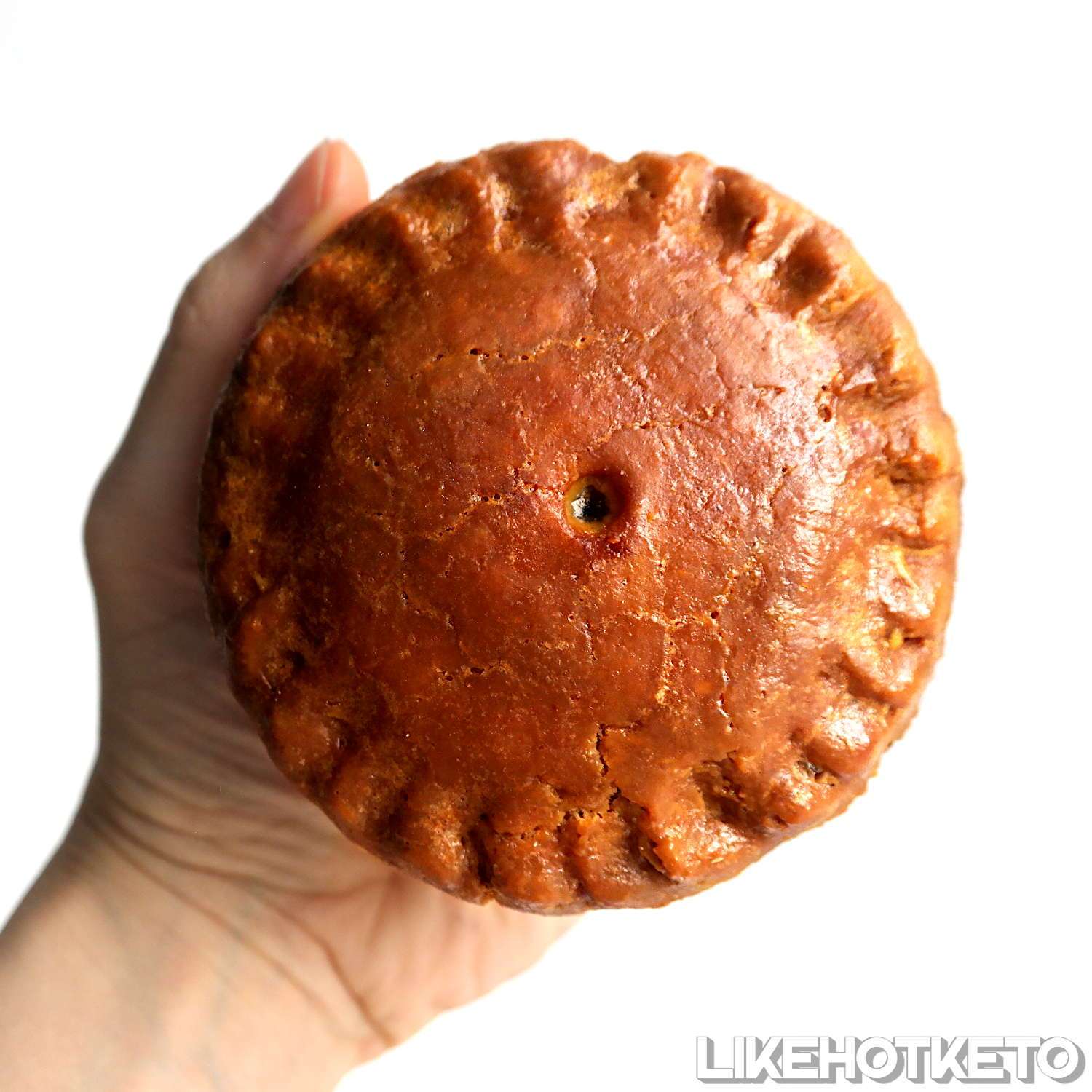
4.6 from 75 votes
Classic British Pork Pie
These keto and gluten-free British pork pies are the most wonderful and versatile hand held food, perfect for road trips, camping and picnics! They are also perfect sliced on a charcuterie board, alongside your favorite chutney or mustard.
Prep Time
30 mins
Cook Time
1 hr 30 mins
Total Time
2 hrs
Servings: 6 pork pies
Calories: 603 kcal
Course:
Breakfast , Snacks
Cuisine:
British
Ingredients
Hot water crust pastry
- 2 cups oat fiber
- 2 cups almond flour
- 1 ½ teaspoon xanthan gum
- 1 teaspoon fine salt
- 2 large eggs 1 for filling and 1 beaten egg for brushing
- ¼ cup butter
- ¼ cup lard
- ⅘ ⅘ cup water (3/4 cup + 1 tablespoon)
Pork pie filling
- 2 pounds pork shoulder or 2/3 pork tenderloin and 1/3 pork belly
- 1 ½ teaspoon fine salt
- 1 teaspoon ground black pepper
- ½ teaspoon red pepper powder
- ¼ teaspoon ground mace or nutmeg
- 1 teaspoon chopped fresh sage and / or thyme
- ½ cup beef stock or bone, chicken
- 1 ½ tablespoon unflavored gelatin powder
Instructions
- In a large bowl, mix together the dry ingredients: 2 cups oat fiber, 2 cups almond flour, 1 1/2 teaspoon xanthan gum and 1 teaspoon fine salt.
- Make a whole in the middle, break ONE of the 2 large eggs inside and mix it up as best as you can.
- In a pan, add 1/4 cup butter, 1/4 cup lard and 4/5 cup water and heat it over medium heat until the fats are fully melted.
- Raise the heat, and as soon as it starts boiling, carefully pour all the liquid, at once, in the middle of the flour mixture.
- Immediately stir everything with a large silicone spatula or wooden spoon. Continue mixing until a homogenous dough is formed.
- Grease each of the pork pie molds.
- When the dough is just cool enough to handle, separate it into 6 large balls (around 120 grams each), and 6 small ones (about 35 grams each).
- Press one of the larger balls of hot water dough into the mold, pushing it the sides and up to the edges. Make sure there are no holes.
Cup of Yum
Pork Pie Filling
- Mince 2 pounds pork shoulder by cutting it very finely by hand, or using a meat grinder with the coarse blade, or using a food processor.
- Add 1 1/2 teaspoon fine salt, 1 teaspoon ground black pepper1/2 teaspoon red pepper powder, 1/4 teaspoon ground mace and 1 teaspoon chopped fresh sage, and mix well. Separate the meat into 6 portions of the same size.
- Put one portion of meat inside each dough lined mold. Leave some space on the top, to attach the lids.
- Stretch the smaller balls of dough into a disc about the size of the top of the pies, to form the lids.
- Beat the second egg, and brush some around the edges of the pie, to help glue the lids in place.
- Place the disc of dough on top of the pie, and gently pinch and press all around it, sticking the top and bottom together.
- Brush the keto pie tops with a thick layer of beaten egg, and make a hole in the center of the pies.
- Pre-heat the oven to 200 °C (390 °F). Bake the pies for one hour, then take them from the oven for a second round of egg wash.
- Turn the temperature down to 175°C (350°F) and bake for another half an hour.
- Remove the keto pork pies from the oven and allow them to cool inside the molds.
- Heat the 1/2 cup beef stock, and stir 1 1/2 tablespoon unflavored gelatin powder, mixing until it's fully dissolved. Wait for it to cool down until it's just warm.
- Pour the liquid gelatin stock slowly inside the keto pork pies through the hole on the top, until it is full. Allow a moment to soak (so it doesn't overflow), the put in some more.
- Take the pies full of stock into the fridge for a few hours at least for the jelly to firm up.
Notes
- Nutrition information shows recipe made with pork shoulder. Recalculate if using different cuts.
Nutrition Information
Serving
1
Calories
603kcal
(30%)
Protein
40.4g
(81%)
Fat
46.3g
(71%)
Net Carbohydrates
3g
Nutrition Facts
Serving: 6pork pies
Amount Per Serving
Calories 603
% Daily Value*
| Serving | 1 | |
| Calories | 603kcal | 30% |
| Protein | 40.4g | 81% |
| Fat | 46.3g | 71% |
| Net Carbohydrates | 3g |
* Percent Daily Values are based on a 2,000 calorie diet.